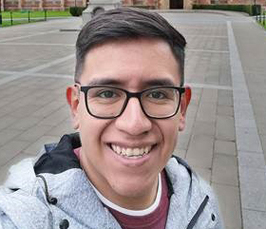Electronic transport and dissipative processes in quantum dynamics: new methodologies and applications
MPSD Seminar
- Datum: 08.06.2022
- Uhrzeit: 10:30 - 11:30
- Vortragender: Carlos Bustamente
- University of Buenos Aires, Argentina
- Ort: CFEL (Bldg. 99)
- Raum: Seminar Room I-III (EG.076-080) and on Zoom
- Gastgeber: Franco Bonafé, Heiko Appel, Michael Ruggenthaler

Abstract:
In the last two decades, quantum dynamics simulations have allowed us to explore different phenomena related to the time-dependent behaviour of electrons in molecules and materials. At variance with methods rooted in linear response theory, one virtue of quantum dynamics consists in allowing for the study of the electronic response to intense electromagnetic fields, transport in open quantum systems subject to time-dependent perturbations, charge separation processes and nonlinear optical effects, to give some examples. In the application of quantum dynamics to realistic physical models of atoms, molecules or supramolecular structures, it is usually necessary to couple the evolution of the electrons to other actors or degrees of freedom, such as charge or energy reservoirs, phonons, and/or photons. Available approximations to tackle these situations are normally either too simplistic or too sophisticated and unworkable in multi-electronic systems with interest in chemistry. This invites to the formulation and implementation of new theoretical approaches, capable to optimise the balance between accuracy and computational cost. In this context, three new theoretical models were developed by our group in the Faculty of Exact and Natural Sciences at the University of Buenos Aires, Argentina. These new models aim to include electronic transport, electron-phonon interaction and radiative dissipation in time-dependent simulations, without increasing the computational cost considerably nor losing accuracy in the description of the phenomena. During this seminar, we will review aspects of the development, implementation and application of these models, and some future perspectives.
In the last two decades, quantum dynamics simulations have allowed us to explore different phenomena related to the time-dependent behaviour of electrons in molecules and materials. At variance with methods rooted in linear response theory, one virtue of quantum dynamics consists in allowing for the study of the electronic response to intense electromagnetic fields, transport in open quantum systems subject to time-dependent perturbations, charge separation processes and nonlinear optical effects, to give some examples. In the application of quantum dynamics to realistic physical models of atoms, molecules or supramolecular structures, it is usually necessary to couple the evolution of the electrons to other actors or degrees of freedom, such as charge or energy reservoirs, phonons, and/or photons. Available approximations to tackle these situations are normally either too simplistic or too sophisticated and unworkable in multi-electronic systems with interest in chemistry. This invites to the formulation and implementation of new theoretical approaches, capable to optimise the balance between accuracy and computational cost. In this context, three new theoretical models were developed by our group in the Faculty of Exact and Natural Sciences at the University of Buenos Aires, Argentina. These new models aim to include electronic transport, electron-phonon interaction and radiative dissipation in time-dependent simulations, without increasing the computational cost considerably nor losing accuracy in the description of the phenomena. During this seminar, we will review aspects of the development, implementation and application of these models, and some future perspectives.